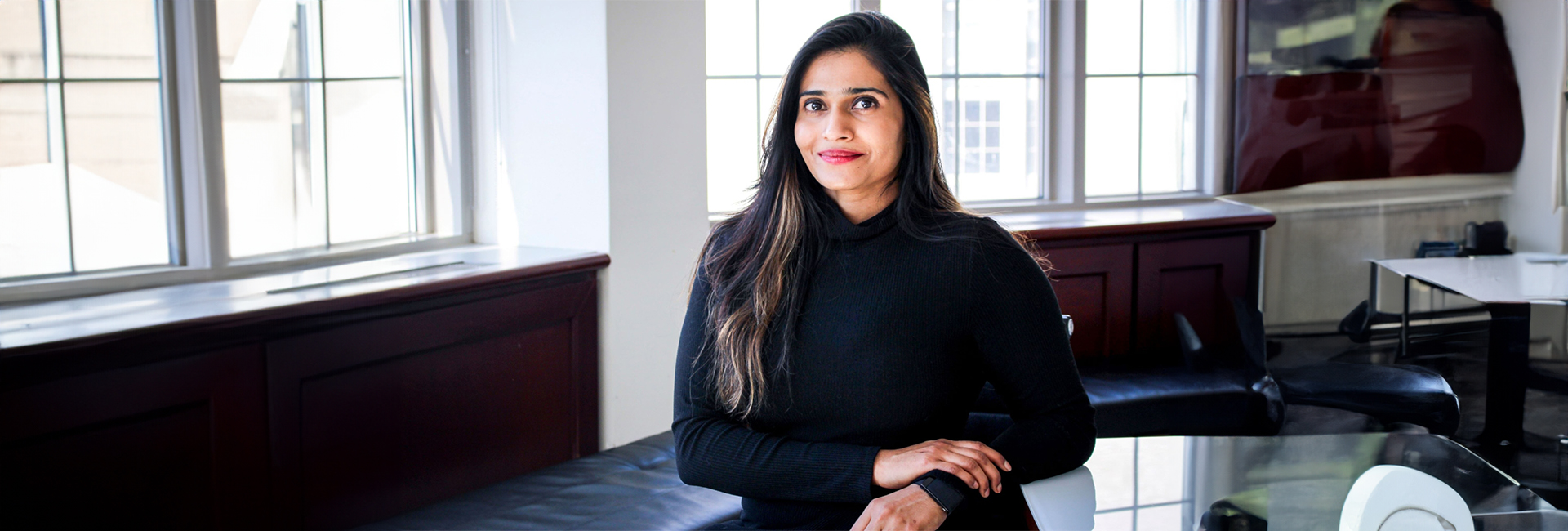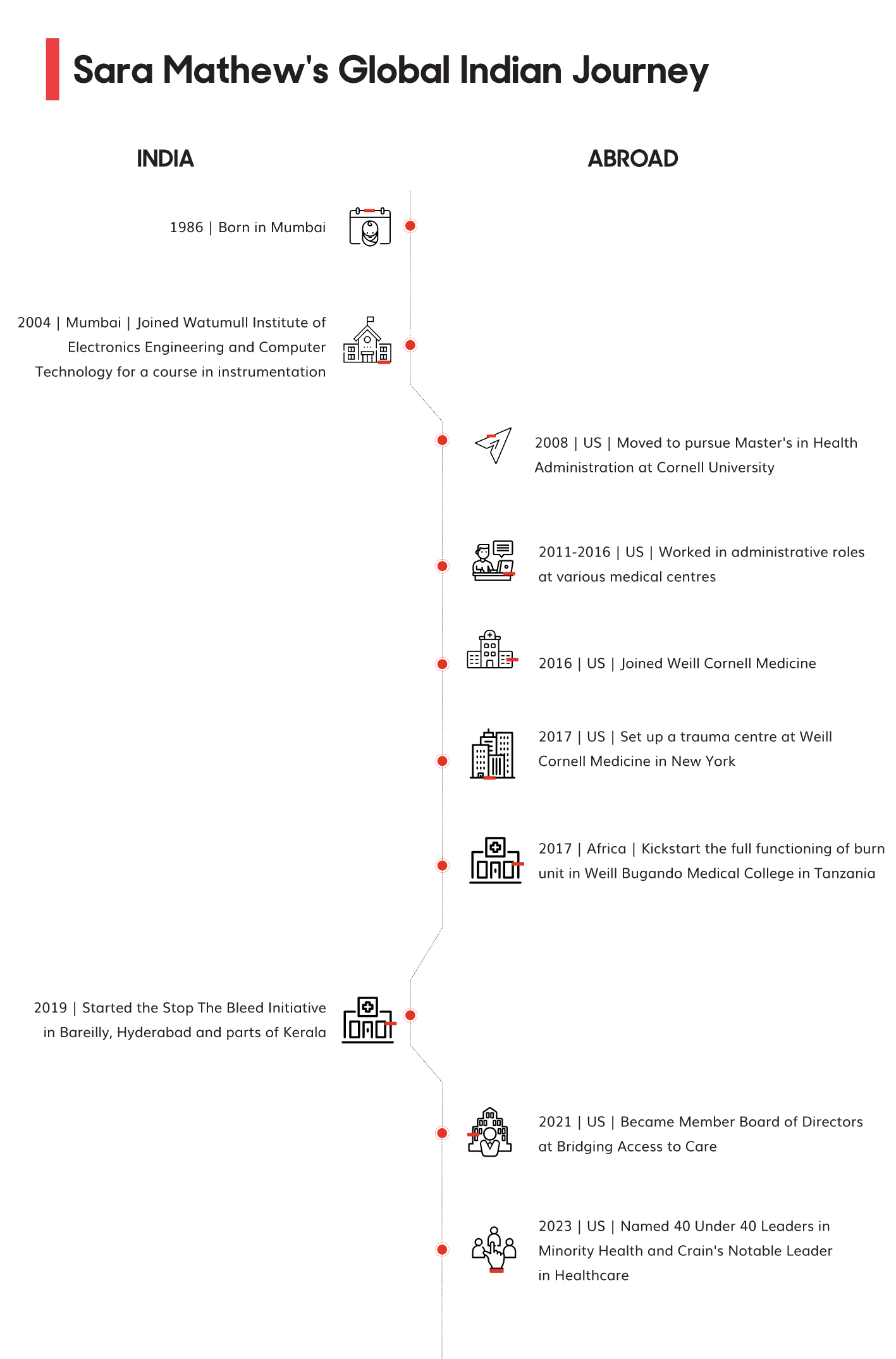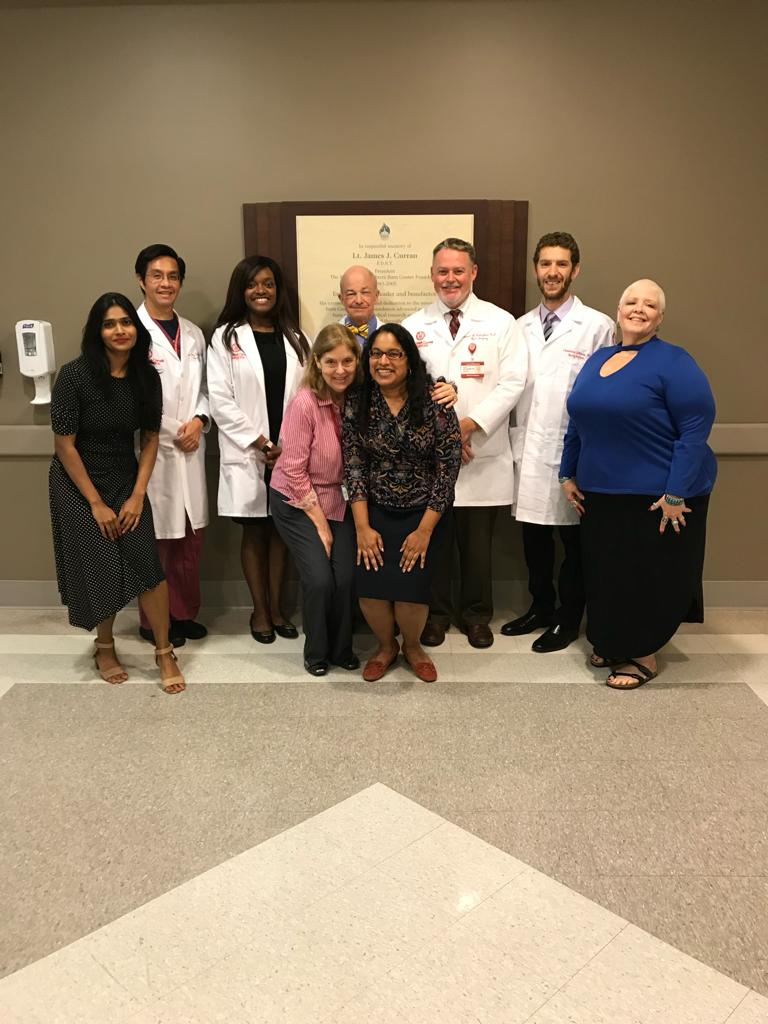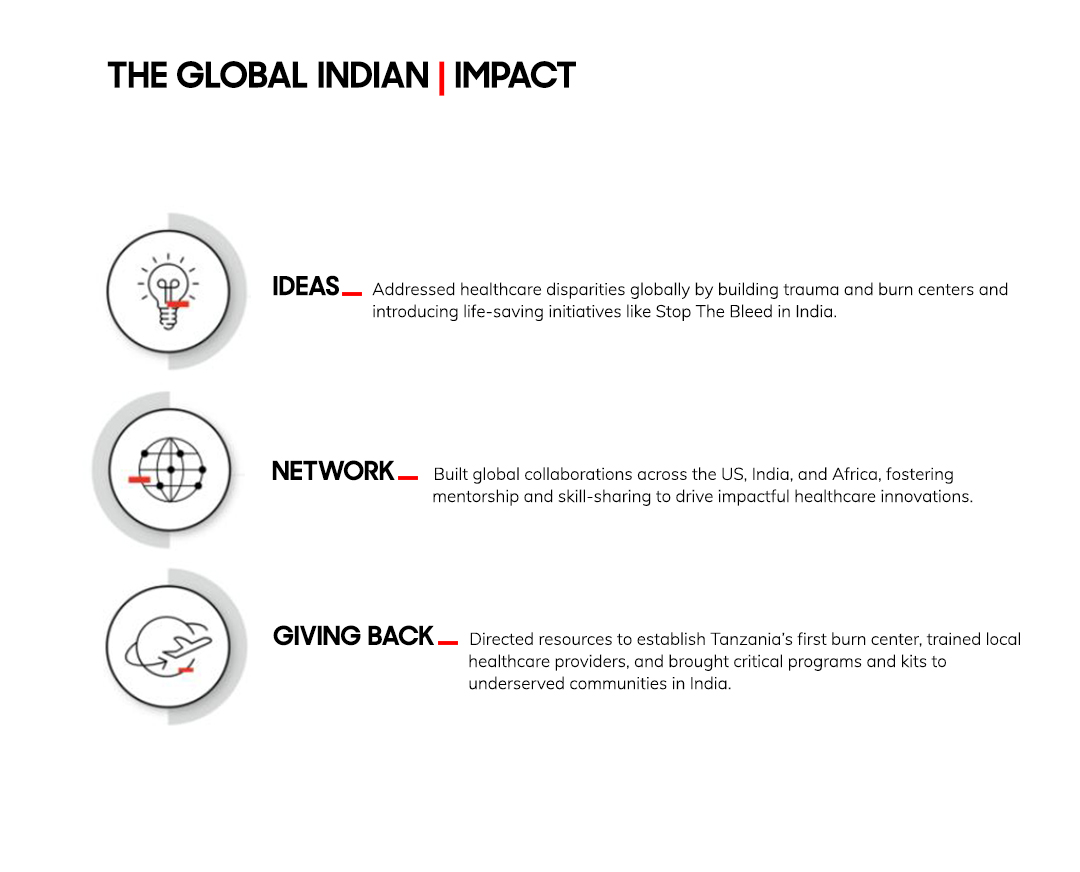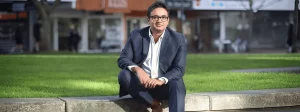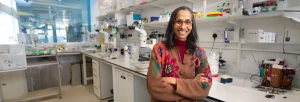(November 26, 2024) In the summer of 2019, the town of Bareilly saw police officers and medical students training under Stop The Bleed, a program extended to India by New York-based Weill Cornell Medicine to train bystanders and ordinary people to act as first responders during accidents. The life-saving initiative made its way to Bareilly through the efforts of Sara Mathew, the Associate Director of Research and Operations Administration at Weill Cornell Medicine, who along with an Indian trauma surgeon, was keen to give back to her homeland. “We both have a connection with India and always had discussions on how we can help India,” she tells Global Indian. The 38-year-old, who moved to the US in 2008, has been working towards closing the gaps in health disparities in the US and abroad. Her efforts have earned her honours including Crain’s Notable Healthcare Leader and a spot on the 40 Under 40 Leaders in Health in 2023 – a recognition that has validated her journey and hardships. “It’s a byproduct of my hard work,” she says.
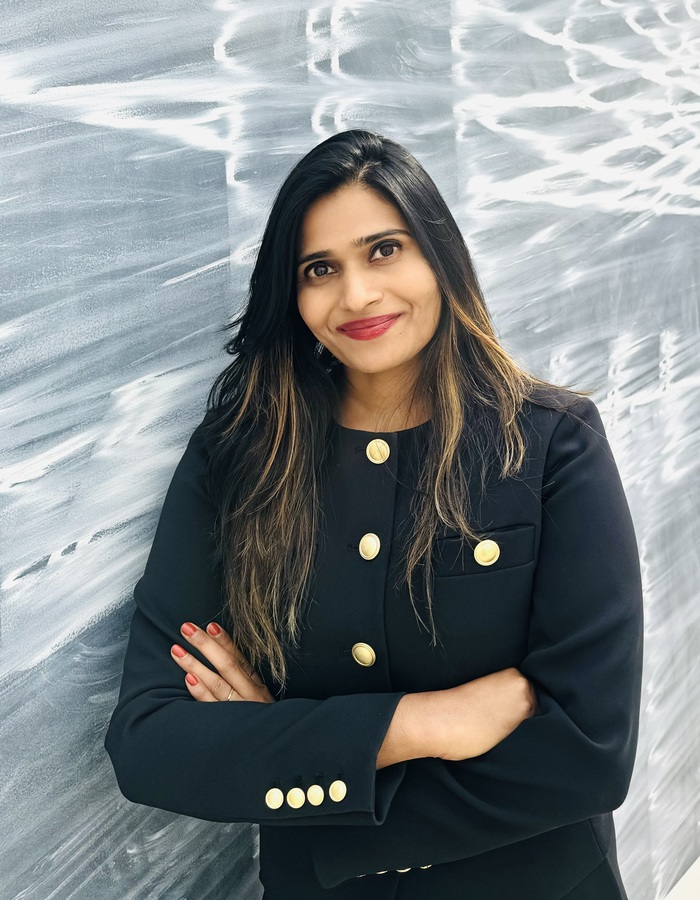
Sara Mathew
When Sara transitioned from engineering to healthcare to start her journey in the US, she faced strong opposition from her family, especially her father. “He was firmly against it,” she recalls. “Now 15 years later, when I was recognised by 40 Under 40, I called him and asked, ‘Do you believe now that I made the right choice?’” smiles the Manhattan-resident, who found her footing in a new country through hard work and perseverance.
Transitioning from engineering to healthcare
Mumbai was Sara’s home until she was 21. In 2008, after completing her engineering in instrumentation from Watumull Institute of Electronics Engineering and Computer Technology, she moved to the US for higher studies. Growing up in a middle-class family with a Math professor father and a mother working in healthcare, she naturally gravitated towards engineering and even secured a merit-based seat. However, those four years of engineering made Sara realise it wasn’t her true calling. She even refused to sit for her on-campus interviews as she didn’t see herself coding for the next 20-30 years. “I had clarity that I wanted to do impactful work.” That’s when she found her inspiration in her mother, who is a nurse by training and worked in administration at Hinduja Hospital. “I would see she was creating a difference with her work, and that’s when I decided to do a master’s in healthcare administration (MHA).”
At the time, applying for MHA in India came with the requirement of a degree in medicine. This redirected her to universities in the US that welcomed students with engineering background. She chose Cornell University, and took off to the US in the fall of 2008. “The transition was hard because I was in a new country and I moved to Minnesota which was nothing like Bombay,” she recalls. “In the US, the only place that comes close to Bombay in terms of people, diversity, and accessibility is New York.” Despite the culture shock, she found comfort in the Indian community at the Minnesota Grad Students Group, who helped her settle in the US.
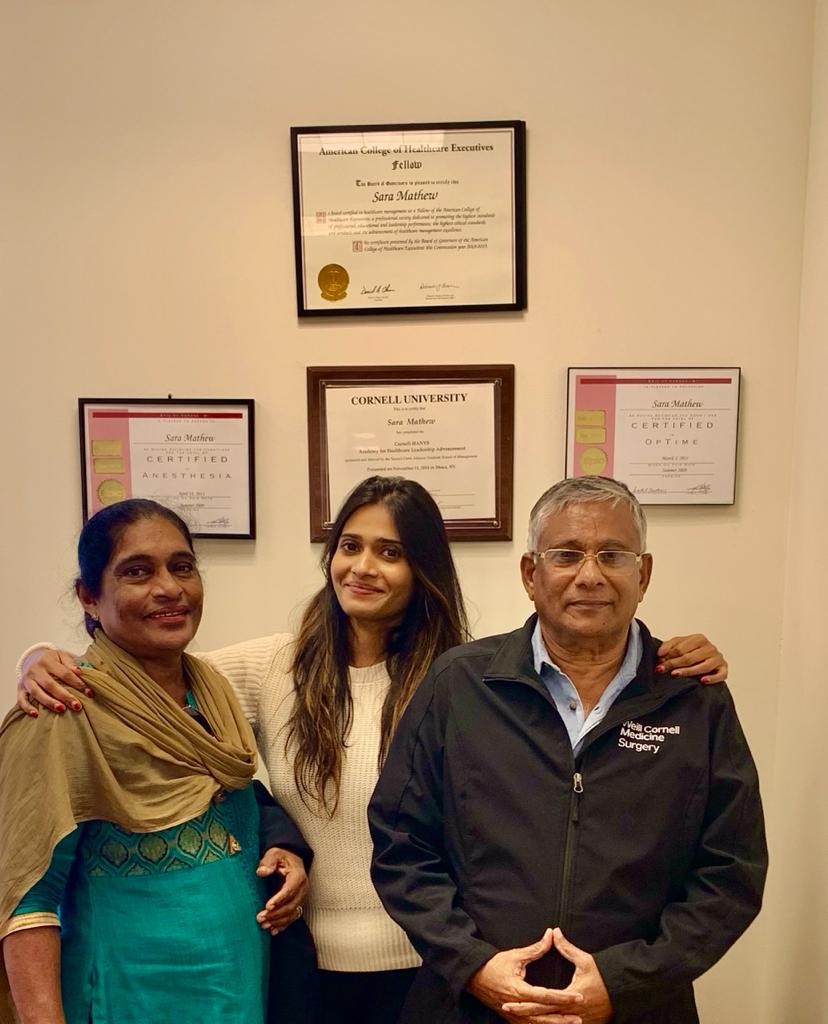
Sara Mathew with her parents
Adjusting to a new country was one challenge, but understanding the American healthcare system was another. “I was starting a step behind from my peers in the class who were from America. I asked my professors to help me with the basic concepts. Also, the mini projects in hospital at the end of each semester helped me learn and apply my knowledge.”
Disparities in healthcare
For many Indians, the American dream represents the promise of a better future, drawing in thousands of non-immigrants to the US each year. But Sara was surprised to find significant health disparities in the US – issues often associated with developing countries. While managing the burn centre at Weill Cornell Medicine in Manhattan, she witnessed the disparities firsthand. “There are many undocumented migrants who have no insurance and even among those with coverage, there’s significant disparity in employer-provided plans. Access to healthcare is another challenge — many people live far from providers or specialists, forcing them to rely on emergency rooms. In Manhattan, where I live, there are five top hospitals within a five-mile radius. But as you move into interiors of New Jersey or Pennsylvania, hospitals and specialists become scarce,” she reveals.
Moreover, language barriers and low health literacy make accessing healthcare even harder. “People who only speak Spanish or Mandarin often avoid big hospitals because they feel confused or scared. Many don’t know how to book appointments online and rely on their kids for help. In rural areas, poor internet access means video visit isn’t an option, so some have no choice but to travel hours to see a doctor,” explains Sara, adding that cities like San Francisco, Seattle, Texas, and Manhattan fare better than other parts of the US. “It all starts with the disparity in insurance. Insurance reforms are very much needed. The Affordable Care Act, introduced by Obama, was a step forward, and Biden has made some updates, but it’s happening at a very slow pace.”
Bridging the gap
Passionate about bringing change and reducing the gaps in healthcare, she helped build the trauma centre. “In 2017, Weill Cornell Medicine was the only hospital in New York to have a burn and trauma centre. I helped them run it so successfully that the money we made in profit was used to run efficiently the burn centre in Bugando Medical College in Tanzania, Africa,” shares Sara, who was shocked to hear that burn injuries are common in Tanzania and second most common cause of accidental death in children under 5 years of age. “With no burn centre, they go to clinics and get bandaged. So, a doctor from the hospital, who was passionate about the cause, visited Tanzania each year with nurses and medical students to set up the centre and perform skin graft surgeries,” says Sara, who had to make sure to have enough funds each year to sponsor her surgeon and his team to go to Tanzania. “We also send supplies, instruments, sponsored the renovation of the unit and trained local doctors and nurses in burn surgery techniques,” she says, adding, “My profession is important because we help run hospitals efficiently.”
Giving back
Keen to give back to her homeland, she joined hands with one of the trauma surgeons, Mayur Narayan, to bring Stop The Bleed initiative to India. Dr Narayan, who was born in India and later moved to the US, lost his uncle aunty in a road accident in Bareilly. With no one to help, they bled out. This prompted him to become a trauma surgeon and wanted to make a difference. “We took the Stop The Bleed to India in 2019 to help victims in road accidents. We trained police officers, medical students and even gave 1000 stop the bleed kits to India.” It began with Bareilly and later was extended to Hyderabad and parts of Kerala.
For Sara Mathew, mentorship is another way of giving back to people who need help in professional development. It began during Covid when she had some time on hand. As the Fellow of American College of Healthcare Executives, she began mentoring and coaching people. “Mentorship is important for me as I want to help people with my knowledge. When I came to the US, I had to figure out many things on my own. Now I want to help people with guidance so that their path becomes a little easy.”
Around the same time, she witnessed vaccine disparity as people in New York got vaccines much earlier and faster that people in Queens and Bronx. “I realised that people don’t have access to vaccines equally. That’s when I became the board member of Bridging Access to Care who help giving healthcare access to uninsured people.”
Being a Global Indian
Having lived in the US for the last 15 years, Sara Mathew is a part of the diaspora that has made significant contributions to the US healthcare sector. From physicians and nurses to researchers and healthcare administrators, they play a vital role in addressing the country’s growing medical demands. Their expertise and dedication have not only helped fill critical gaps in care but have also advanced medical research and technology.
“A Global Indian means being someone who takes some of the Indian values and applies in another country to build a community. It’s not a community of Indians but global citizens.” — Sara Mathew
AI in healthcare
With AI coming up in a big in the recent past, revolutionising industries from finance to education—and healthcare is no exception. However, Sara is of the opinion that AI can never replace clinicians. ” The way AI can help in healthcare is by elevating some of the administrative backlog like notewriting, transcribing, preauthorisation process and analysis of huge datasets to help find patterns of certain diseases that the human eye can’t catch.”
The healthcare professional, who loves trying new food and going on hikes with her dog Barfi, wants to promote her work to find collaborators interested in bridging healthcare disparities. “I would want to pick one zipcode or more and find out if they have access to healthcare and how I can help them. Is it by providing collaborations with hospitals or clinics or if I can apply for grants? Not just in the US but also in India. I want to create an organisation or a network that truly works on improving the healthcare infrastructure. That’s my next big goal,” she signs off.
- Follow Sara Mathew on LinkedIn
Read a similar story of Dr Harshit Jain, revolutionising healthcare advertising through AI.

